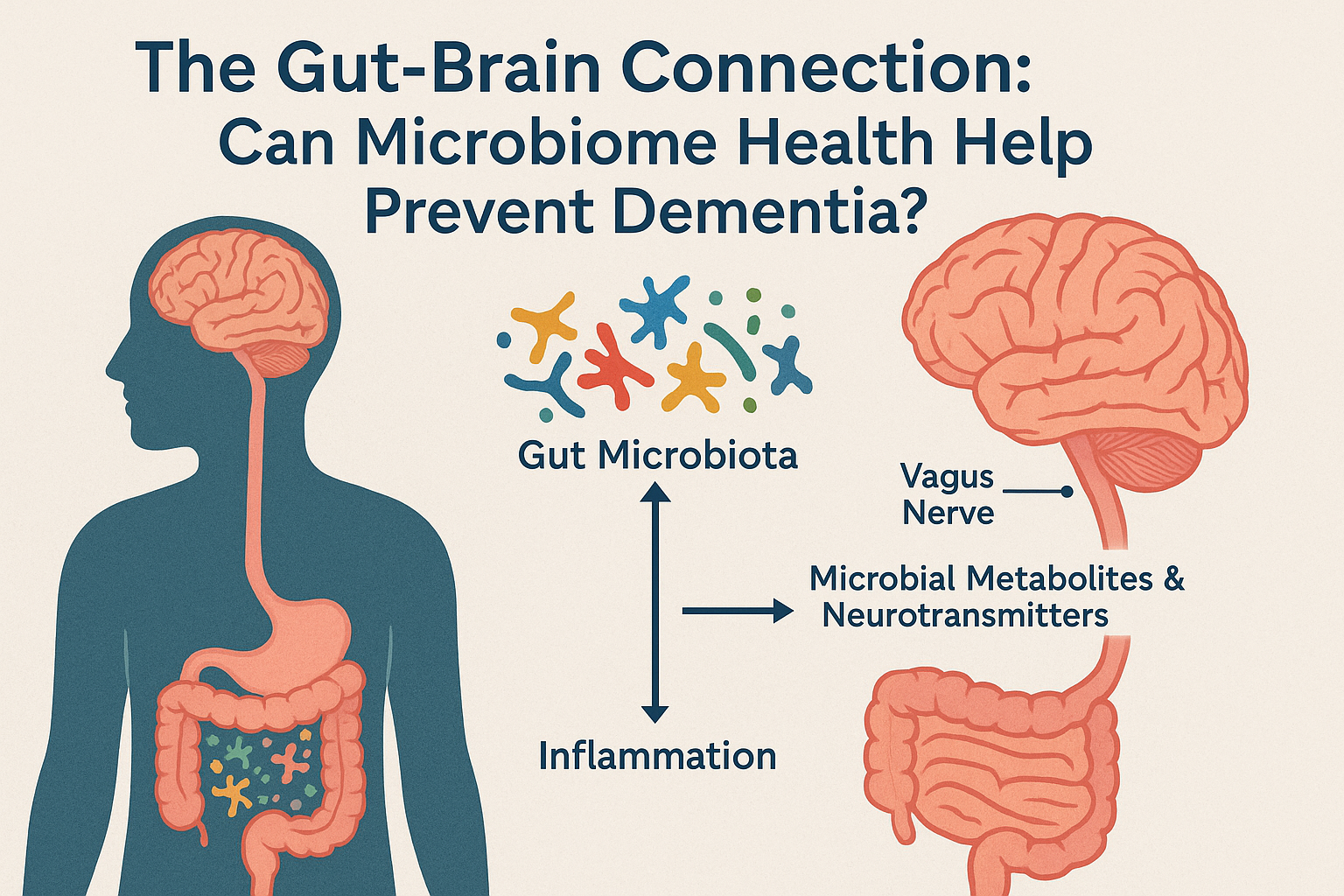Welcome to Dementia World elderly home services



Our bodies hold trillions of microorganisms, most of them living in the gut. These tiny microbes are turning out to be powerful allies—or enemies—when it comes to brain health. Today, emerging research reveals a fascinating connection between the gut and the brain. Scientists are now exploring how maintaining a healthy gut microbiome might help prevent or delay the onset of dementia. Let’s dive into the science behind this gut-brain connection and how simple dietary and lifestyle choices can support cognitive health.
The gut-brain axis refers to the complex communication network between the gastrointestinal tract and the brain. This system involves nerves, hormones, and immune signals, all influenced by gut microbes. Researchers have found that changes in the gut microbiome can directly affect brain function, mood, and even memory.
The microbiome is the community of microorganisms—including bacteria, viruses, fungi, and protozoa—that live on and inside the human body. The gut microbiome, in particular, plays a critical role in digestion, immunity, and inflammation.
Gut bacteria:
Help digest fiber and produce short-chain fatty acids (SCFAs)
Support the immune system
Influence the production of neurotransmitters like serotonin and dopamine
Regulate inflammation—an essential factor in brain health
The vagus nerve acts like a two-way communication line between the gut and the brain. It carries messages about hunger, stress, and inflammation—making it central to the gut-brain axis.
Some gut bacteria produce chemicals that mimic neurotransmitters. These compounds can influence mood, memory, and behavior, providing a direct microbial route to mental and cognitive health.
Recent studies in the Journal of Alzheimer’s Disease and Nature Neuroscience show that people with dementia often have less diverse gut microbiomes. Researchers observed that certain bacterial strains were more common in people with cognitive decline.
Gut dysbiosis (imbalance) can lead to a “leaky gut,” allowing harmful substances into the bloodstream. These toxins may pass into the brain, promoting inflammation—a known trigger for Alzheimer’s and other types of dementia.
The Mediterranean diet, rich in fiber, healthy fats, and polyphenols, promotes microbiome diversity. Several studies link this diet to reduced dementia risk.
Key components include:
Olive oil
Leafy greens
Fatty fish (rich in omega-3s)
Legumes and whole grains
Prebiotics (fiber that feeds good bacteria) and probiotics (beneficial bacteria found in yogurt and kefir) are essential for gut health.
Top choices:
Prebiotic foods: garlic, onions, leeks, bananas
Probiotic foods: yogurt, kefir, kimchi, sauerkraut
Chronic stress negatively impacts gut health by altering microbial diversity and increasing inflammation. Mindfulness, meditation, and physical activity can all support a balanced gut-brain axis.
Poor sleep alters gut bacteria, leading to inflammation and mental fog. Maintaining a consistent sleep schedule can benefit both the gut and the brain.
Long-term studies suggest that individuals with healthier microbiomes experience slower cognitive decline. While direct prevention isn’t guaranteed, strong correlations support proactive gut health strategies.
Though promising, the field is still evolving. Large-scale human trials are underway to determine if targeted dietary and probiotic interventions can delay or prevent dementia.
Several companies offer stool testing kits to analyze your gut microbiome. These reports highlight bacterial diversity and suggest personalized nutrition plans.
Custom plans based on microbiome tests can guide dietary tweaks—like increasing fiber, reducing sugar, or adding fermented foods—to optimize cognitive outcomes.
Not all probiotics are created equal. Over-the-counter supplements may not survive stomach acid or colonize the gut effectively. Food-based probiotics are often more effective.
Gut health is real science—not just a wellness buzzword. However, avoid exaggerated claims and opt for evidence-based approaches.
Eat at least 25–30 grams of fiber daily
Include fermented foods in your diet
Stay physically active
Get 7–9 hours of sleep
Limit processed foods and sugars
| Add | Avoid |
|---|---|
| Leafy greens | Refined sugars |
| Whole grains | Processed meats |
| Berries | Fried foods |
| Fatty fish | Artificial sweeteners |
1. Can probiotics prevent Alzheimer’s?
Not directly, but probiotics may support brain health by reducing inflammation and improving gut integrity.
2. How quickly can diet changes improve gut health?
Changes can begin within a few days, but long-term benefits develop over weeks to months.
3. Is the gut-brain axis proven or still theoretical?
The gut-brain axis is supported by strong scientific evidence, though research is ongoing.
4. Should seniors take microbiome supplements?
Only under medical advice. Whole-food solutions are generally safer and more effective.
5. How does sugar impact the gut and brain?
Excess sugar feeds harmful bacteria, promotes inflammation, and may impair memory.
6. Can kids benefit from gut-brain health awareness?
Absolutely! Early habits shape lifelong microbiome and brain development.
The gut-brain connection is more than a scientific curiosity—it’s a pathway to better mental health and possibly a reduced risk of dementia. By nurturing the microbiome through smart food choices, adequate sleep, stress reduction, and physical activity, we may support not just our digestive system, but also our cognitive vitality.